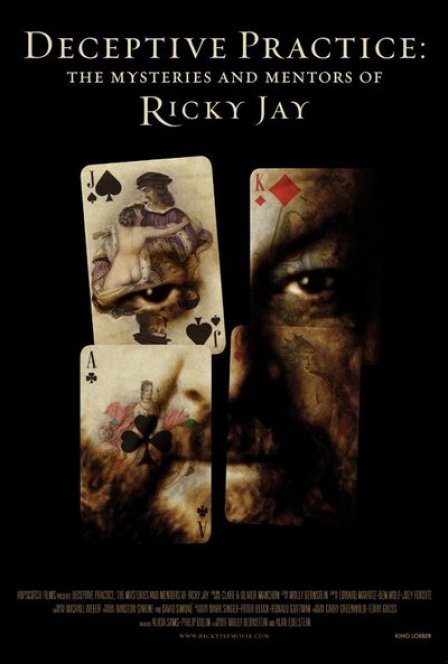Magic and cinema have been intertwined since the very first shyster set up his very first nickelodeon on some boardwalk in some East Coast city. Cinema is a natural progression from the classic sleight of hand effects and illusions that captured the larger public’s imagination for centuries before its invention, and it’s not surprising that among early filmmakers the most inventive were folks initially trained as magicians (chief among them being Georges Méliès, natch). It’s also unsurprising that some of the most fascinating directors of the 20th century showed an at times unhealthy preoccupation with magicians during their formative years (Woody Allen, Fellini, Bergman, et. al.). And so it makes sense that a documentary about a magician cum actor would be as fascinating as this one is.
Ricky Jay, the subject of Deceptive Practice, has been professionally involved with magic since he was a four-year-old (at least according to him), and what sets him apart from other late 20th century magicians is a seamless crossover to working in film. Whereas so many other magicians have made appearances on TV or film that only draw attention to their careers outside the medium, Jay so thoroughly inhabited the roles he performed in various David Mamet productions — that crazy episode of the X-Files where he totally loses his head, and of course Deadwood — that it’s safe to say most people under a certain age are blissfully unaware of his pedigree as an heir apparent to some very influential magicians.
A decent chunk of this film explores Jay’s relationships with the men who shaped him into the accomplished magician and performer he became before playing a pivotal role in several of David Mamet’s films and doing the narration for Paul Thomas Anderson’s Magnolia and Rian Johnson’s The Brother’s Bloom. Original vaudevillian magicians like Dai Vernon and Charlie Miller took Jay under their wing as he learned all he could about the history and arcane practices of his trade. Jay studied to such an extent that he amassed enough material to write several explosive (though highly dubious) books about the history of magic and one notably sensational volume chiefly concerned with how to kill people using nothing but playing cards.
The film, in illuminating the arc of Mr. Jay’s life and career, has plenty of light moments, and really blissful pieces that leave you scratching your head. But underneath everything, Jay’s story is one of isolation, secrecy, and estrangement. Growing up in fairly conservative Jewish household in suburban New Jersey, his straight-laced financially sound parents warned him against trying to make a living doing magic tricks. His final response to this encouragement was to sever ties with them completely before attending high school, apparently never having come into contact with them since. A perennial loner, Jay’s true solace lies not in companionship, but in endless hours sitting along working on a particular playing card effect, existing in a quasi zenlike state for as long as it takes to move beyond the point where an effect requires effort.
The drive behind truly great magicians throughout history wasn’t a desire to delight, entertain, or even pull one over on an audience. While these surely factored into the initial decision to spend countless hours perfecting magic tricks, the most basic want these extraordinarily disciplined performers held in common was the thrill of feeling in absolute control over an entire group of people. Deceptive Practice is an exhilarating representation of this frightening tendency. Jay doesn’t come off as a man overly concerned by whether you had a good time at one of his shows, but he’s serious as a heart attack about making sure he shook you up a little bit. What sets this documentary apart is the eerie feeling it manages to instill. When you’re through watching it, you realize you’ve encountered so many unbelievable things, and you have no idea which of them are worthy of your disbelief’s suspension.

